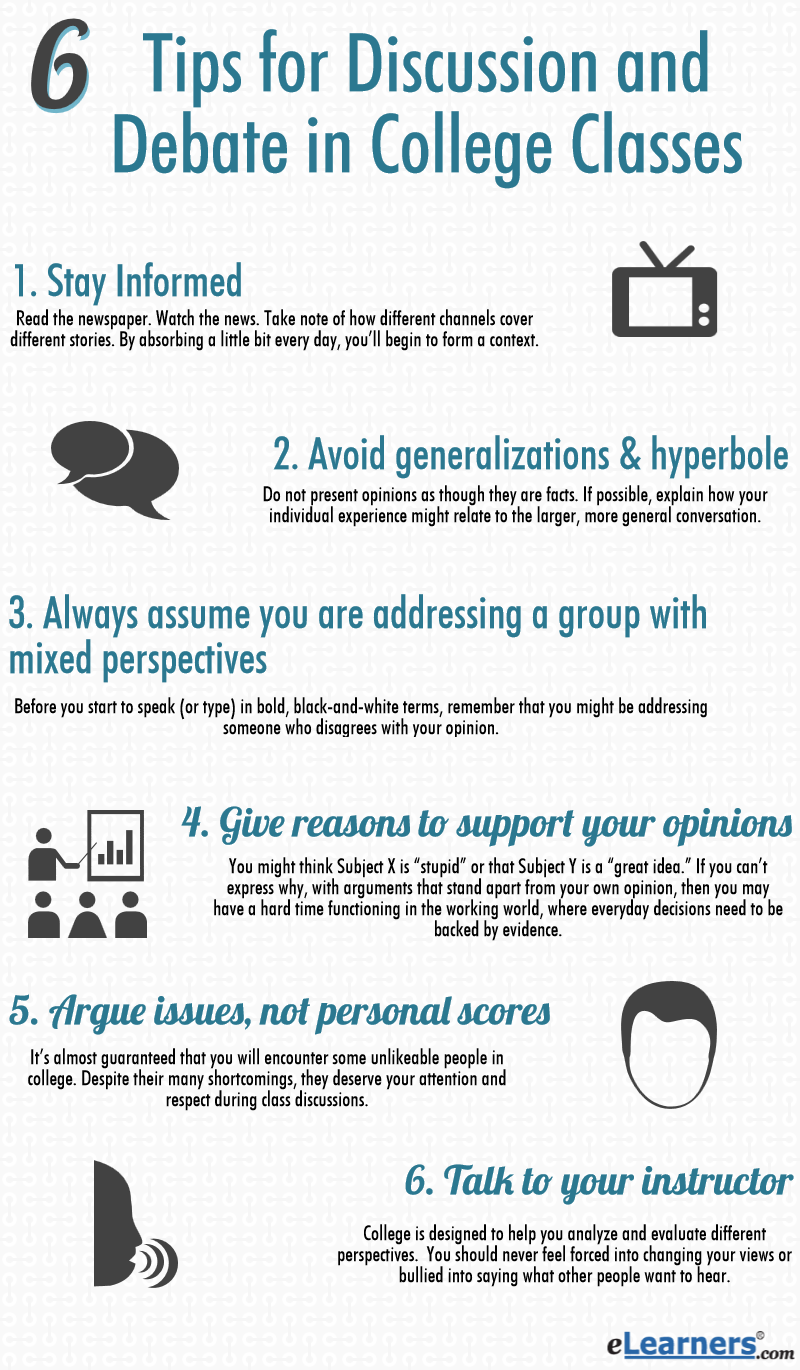 When it comes to your college choice, do you feel that a school’s political atmosphere is important? Do you expect classmates and instructors to share your views? Or are you looking forward to a college experience that might challenge your ideas and expand what you already know about social issues, economics, philosophy —even ethics?
When it comes to your college choice, do you feel that a school’s political atmosphere is important? Do you expect classmates and instructors to share your views? Or are you looking forward to a college experience that might challenge your ideas and expand what you already know about social issues, economics, philosophy —even ethics?
Regardless of the college you choose, take a moment to review these tips for college discussion and debate. They could save you from hurt feelings… or hurt grades.
Stay Informed
Many of us form opinions about a political topic after only reading/hearing a quick blurb. But that’s no excuse for making snap judgments about candidates, policies, and social issues. And snap judgments probably won’t hold water in a college class discussion.
If you take a course in philosophy, business, English, or sociology, you may be asked to write an opinion paper about current events. Instead of waiting around to get this assignment, make an effort to stay informed on your own. Choose a reputable news blog to follow every day, or set up your email account to receive “alerts” whenever stories arise that might interest you.
Read the newspaper. Watch the news. Take note of how different channels cover different stories. By absorbing a little bit every day, you’ll begin to form a context. Political context is important because it helps us to see how choices and events are all connected—throughout time and across geographic borders.
Avoid Generalizations and Hyperbole
We often resort to generalizing and exaggerating when we don’t have enough information to make a strong case for something. Some of us do it out of habit. Some of us do it when we are angry. Whenever you catch yourself using extreme labels or making broad statements, stop to check that there’s a verifiable source behind the claim.
It may be difficult to quantify your personal experiences or opinions with facts and sources. That’s okay. You can still use personal experience/opinion in class discussions, just be sure to acknowledge that that’s what it is. Do not present opinions as though they are facts. If possible, explain how your individual experience might relate to the larger, more general conversation. In formal papers—like research papers or capstone projects—you should ask your instructor if personal opinion is admissible. Many teachers don’t want you to mix your own views with scholarly sources.
Always Assume You Are Addressing a Group with Mixed Perspectives/Values
Some of us are so invested in our own political parties and social values, we forget that the world is full of differing opinions. Sometimes we believe in a cause or a candidate so earnestly, we assume that all other rational people must also feel the same way. This is a big mistake—especially in a college classroom or an online discussion forum.
College students and college instructors can have very different views. Some views are deeply ingrained and very passionately defended. Before you start to speak (or type) in bold, black-and-white terms, remember that you might be addressing someone who disagrees with your opinion. This shouldn’t prevent you from sharing your thoughts, but it should give you pause and dissuade you from using dismissive, disrespectful language.
Give Reasons to Support Your Opinions
America is a great place to live because (for the most part) you can say whatever you like. You can claim that Grover Cleveland was the best president ever...or that Nixon was the worst. But whatever you say, people are more likely to listen if you have fact-based reasons to support your ideas. This is a key lesson in college—one that your instructors will work hard to instill.
Without reasons and factual assertions, debate of any kind can quickly devolve into petty, name-calling sessions. You might think Subject X is “stupid” or that Subject Y is a “great idea.” If you can’t express why, with arguments that stand apart from your own opinion, then you may have a hard time functioning in the working world, where everyday decisions need to be backed by evidence.
Teachers need to validate their lesson plans, based on testing goals and learning outcomes. Real estate agents need to provide comparables and market trends for housing prices. Lawyers and paralegals are constantly digging up precedents or historic examples of what should be allowed in the courtroom. Your career goals will also require fact-based reasoning.
Argue Issues, Not Personal Scores
It’s almost guaranteed that you will encounter some unlikeable people in college. Unlikeable people are everywhere—at work, at school, at the grocery store, at PTA meetings... They may be unlikeable for any number of reasons. Maybe they are loud and annoying. Maybe they are rude and inconsiderate. Maybe they pretend to know everything. Despite their many shortcomings, they deserve your attention and respect during class discussions.
If Unlikeable Joe posts a ridiculous comment to your class board, you absolutely must refrain from responding to Joe, as the owner of the comment. Instead, you should address the comment itself.
Talk to Your Instructor
If you follow the rules above, and you still feel isolated or outnumbered, you might want to schedule a meeting with your instructor. College is designed to help you analyze and evaluate different perspectives. You should never feel forced into changing your views or bullied into saying what other people want to hear. You also shouldn’t let other students waste your time and money with ignorant comments or self-serving interruptions that hijack your class time. Even if your instructor supports a different political party than you, he or she should be willing to help you get the most out of your coursework.
